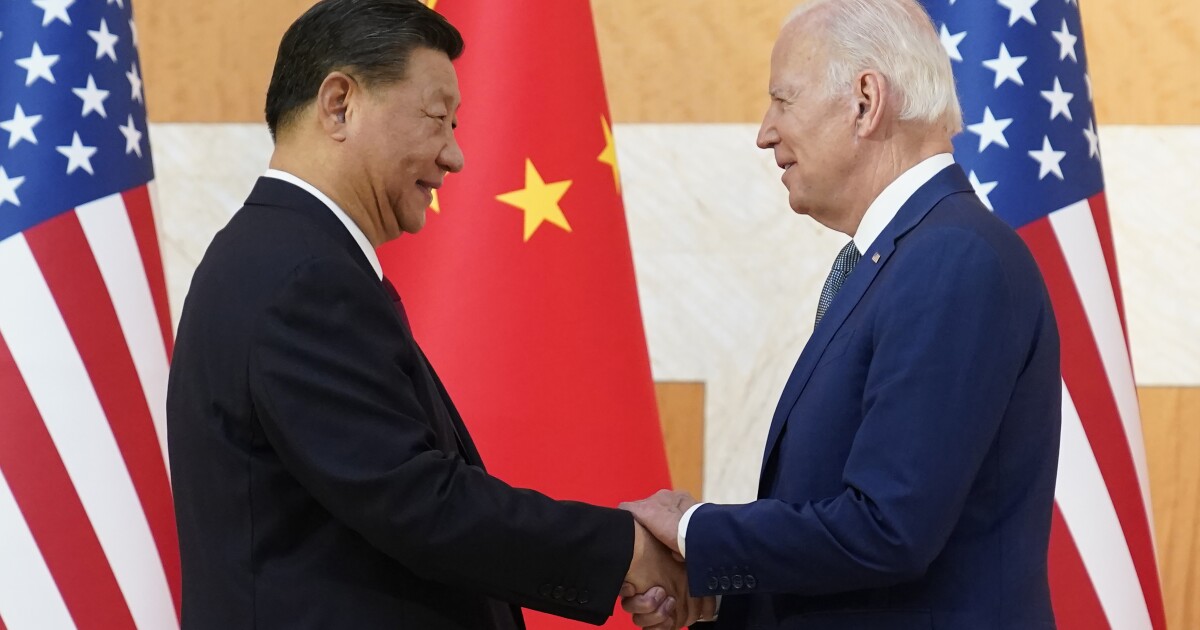

SAN FRANCISCO — For President Joe Biden, politics does not stop at the water’s edge — or the edge of the bay, in this case — regarding his highly anticipated meeting with Chinese President Xi Jinping.
Although the leaders’ top agenda items relate to foreign policy, their highly anticipated sit-down, the first since last spring’s Chinese spy balloon incident, has political repercussions for Biden at home.
BIDEN-XI MEETING: TRUMP REMATCH ANXIETY HAMPERS ECONOMIC COMPETITION WITH CHINA
For Biden, a successful meeting with Xi means circumventing a foreign policy crisis with China before next year’s elections, according to Council of Foreign Relations China senior fellow Ian Johnson.
“The U.S. already has enough on its plate with the Israel–Hamas conflict and the war in Ukraine,” Johnson told the Washington Examiner. “They don’t need to have a crisis with China in an election year.”
Johnson, echoing other close observers of China, predicted a fentanyl announcement. That would be politically “useful” for Biden in the “heartland,” where there is a “fentanyl plague going on right now,” he said.
The meeting is important for other reasons too, namely that Xi is now in an unprecedented third term as president and many of his contemporaries have been “sidelined” or “retired” as part of “a purge and political instability,” per Johnson.
“This turmoil at the top makes it imperative that the United States get messages directly to the leadership in China,” he said. “The gatekeepers seem to be stronger than ever when Xi’s alone at the top.”
Johnson’s colleague Joshua Kurlantzick, CFR’s Southeast Asia senior fellow, added Xi is also the first Chinese leader to use “China’s great power status” and advocate “constructing, possibly, an alternative world order.”
“China’s facing massive problems but, on the international stage, Xi has led China to be assertive in a way no other leader has since Mao and to push to be essentially an equal to the United States.”
But for David Stilwell, assistant secretary of state for the Bureau of East Asian and Pacific Affairs under former President Donald Trump, Biden has “absolutely nothing” to gain from meeting Xi after Secretary of State Antony Blinken‘s, Treasury Secretary Janet Yellen‘s, and Commerce Secretary Gina Raimondo‘s trips to China this year.
BIDEN-XI MEETING: FAMILIES OF AMERICANS WRONGFULLY DETAINED IN CHINA NOT OPTIMISTIC
“It’s basically proving to the Chinese side that we think we need a relationship more than they do,” he said. “I certainly wouldn’t meet face to face with a person who the United States has determined is committing genocide.”
Stilwell, a Vandenberg Coalition advisory board member, similarly dismissed the importance of military-to-military communication. There is speculation the U.S. and Chinese militaries will recommence communication after it was suspended last year following former House Speaker Nancy Pelosi‘s (D-CA) visit to Taiwan and amid last month’s near collision between a U.S. B-52 bomber and Chinese fighter jet over the South China Sea.
Comparing U.S.-China relations to a “building a bridge,” Stilwell said, “Every time we start getting closer to their shore, they destroy the work we’ve done so far and then leaving us to do more work to somehow fix the relationship with the [People’s Republic of China] side keeps destroying.”
Matthew Goodman, director of the CFR’s Greenberg Center for Geoeconomic Studies, acknowledged the domestic political sensitivities but argued Biden is “not going to be taking a line that is soft on China.”
“He’s going to be raising a lot of tough issues,” he said. “Whether you like it or not, it’s an important relationship, and he needs to meet with the Chinese leader to make sure we’re not going to have some kind of miscalculation that can lead to real conflict.”
The White House has tried to manage expectations regarding the meeting, Biden and Xi’s seventh sit-down during Biden’s presidency but only their second in person. It is scheduled for Wednesday morning in the San Francisco area on the sidelines of the Asia-Pacific Economic Cooperation summit, where demonstrators have already caused havoc.
“We know efforts to shape or reform China over several decades have failed, but we expect China to be around and to be a major player on the world stage for the rest of our lifetimes,” one senior administration official said. “The balloon episode underscored the difficulty we had at the time to be able to establish high-level, consequential communications with Beijing, and we’ve made that case persistently and consistently.”
The White House has previewed that Biden and Xi will discuss the “importance of open lines of communication” between the United States and China and managing the countries’ competition “responsibly.” In addition to Taiwan and the South China Sea, the former of which has its own elections next year, other topics will likely include Russia‘s invasion of Ukraine, Israel’s war against Hamas, arms control, trade, debt, climate, and human rights.
CLICK HERE TO READ MORE FROM THE WASHINGTON EXAMINER
Biden is additionally tipped to announce a new pan-Asian trade deal, the Indo-Pacific Economic Framework for Prosperity, which Trump has already criticized as a new Trans-Pacific Partnership. The accord coincides with House Speaker Mike Johnson‘s (R-LA) attempts to fund the government past Nov. 17 and China’s economic growth slowing.
Stilwell discouraged Biden from “galloping to ride to the rescue” of China’s economy. Instead, he encouraged the president to continue “protecting our critical industries and capabilities” and preventing “direct investment” from China.






